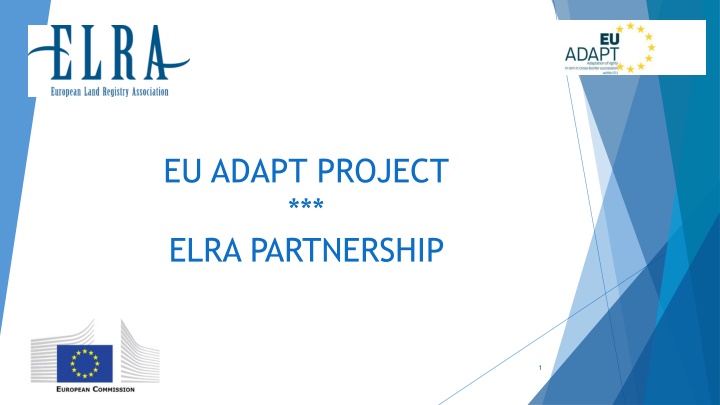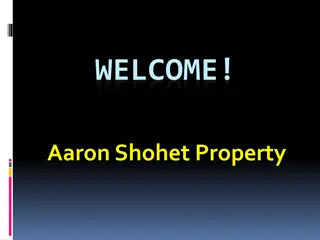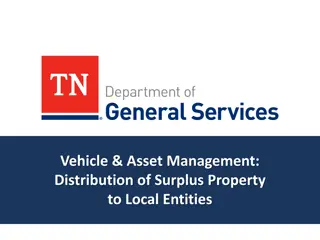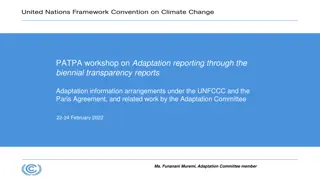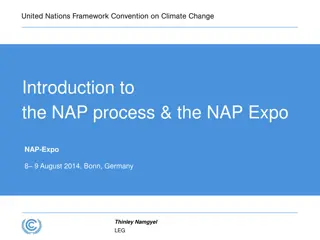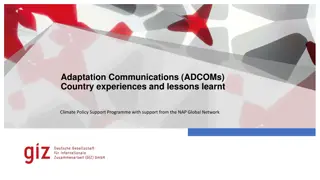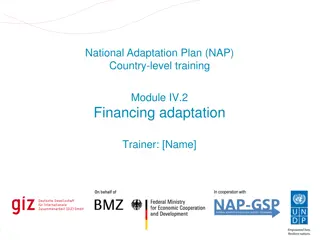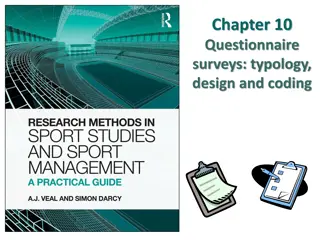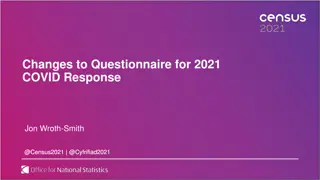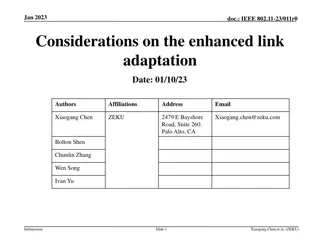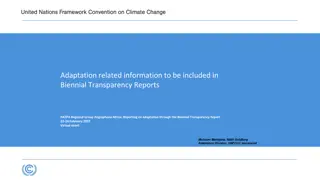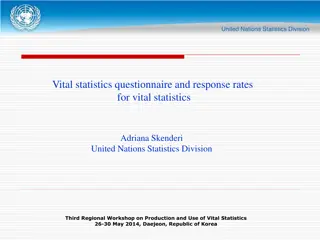EU Adaptation Project & Property Rights Questionnaire
This content delves into the EU Adapt Project's collaboration with ELRA Partnership in the area of property rights, focusing on the adaptation of rights in rem. It also includes a comprehensive questionnaire addressing different aspects of property ownership, co-ownership, and condominiums within the European legal framework.
Download Presentation

Please find below an Image/Link to download the presentation.
The content on the website is provided AS IS for your information and personal use only. It may not be sold, licensed, or shared on other websites without obtaining consent from the author.If you encounter any issues during the download, it is possible that the publisher has removed the file from their server.
You are allowed to download the files provided on this website for personal or commercial use, subject to the condition that they are used lawfully. All files are the property of their respective owners.
The content on the website is provided AS IS for your information and personal use only. It may not be sold, licensed, or shared on other websites without obtaining consent from the author.
E N D
Presentation Transcript
EU ADAPT PROJECT *** ELRA PARTNERSHIP 1
REGULATION (EU) 650/2012 of 4 July 2012 European Succession Regulation _ The Adaptation Principle 2
Adaptation of rights in rem - article 31 Aims: - Provide a standard description of each right in rem in the MS bound to the European Succession Regulation - Identify the aims and the interests pursued and the effects attached to each specific right in rem - Suggest a correspondence between the right in rem granted by the lex successionis and the rights in rem known in the country where the property is located along with juridical support - Build a EU-ADAPT informatic tool or integrate within ELRA tools 3
Questionnaire A. Is it possible to create property rights different from the ones regulated by the law? - numerus clausus or numerus apertus B. In case the private parties are not allowed to create property rights different from the ones allowed by law, how broad is their freedom to determine the content of those rights C. How many immovable property rights are there and what is their designation? 4
Questionnaire 1. Proprietas / Ownership 1.1. Is temporary ownership accepted if yes what is the time limit 1.2. Is conditional ownership accepted 1.3. Is it possible to constitute a trust (inter vivos or mortis causa)? 1.4. Are there legal institutions, whose effects are mortis causa, able to impact ownership? 1.5. In case of temporary or conditional ownership are there restrictions on the powers of the temporary owner? 1.6. What is the purpose of the legal institutions affecting the content and/or duration of ownership? 5
Questionnaire 2. Co-ownership 2.1. Describe co-ownership in your system 2.2. Describe the powers of the co-owner regarding the use and the administration 2.3. Can a co-owner transfer the right on property? 6
Questionnaire 3. Condominium 3.1. Is condominium possible? 3.2. Describe condominium in your system 3.3. Describe the powers of each unity owner regarding the use, the administration of the individual unit and common areas 3.4. Can a unity owner freely transfer the right? 7
Questionnaire 4. Rights in re aliena 4.1. Identification and short description of the rights in rem 4.2. Rights recognized to the holder 4.3. Duties bounding the holder 4.4. Is it possible to constitute the right in benefit of a legal person? 4.5. Is it possible for the holder to change the substance and the economic destination of the res? 4.6. Is the holder obliged to administer and to provide for the ordinary upkeep of the res? 8
Questionnaire 4. Rights in re aliena 4.7. Is it possible to set the right as temporary and as a lifetime benefit? 4.8. Is this right transferable mortis causa and inter vivos? 4.9. Does the right in rem end if not exercised for some period of time? 4.10. Is it possible for the owner of the res to be simultaneously the holder of the right? 4.11. Is it possible to waive to the right? 9
Responses 19 from 19 different MS 10
A. numerus clausus or numerus apertus In the majority of the MS the numerus clausus principle is in force. Athough with the possibility for some contractual openess, 15 out of the 19 answers refer to the existence of numerus clausus In Sweden despite the numerus clausus there is not an exhaustive list of property rights. However rights concerning immovable property that can be registered are regulated in Swedish law and regulation. 11
A. numerus clausus or numerus apertus In 5 countries the numerus apertus principle is in force: Finland with some limitations Ireland the rights based on contracts cannot be registred or it depends on its content Lithuania - the principle of freedom of contract applies however such unknown rights in the said contracts are not subject to registration Luxemburg Spain - every unknown property right must have: - the typical requirements of real rights: absoluteness and immediacy; - external characteristics that make them transcend to third parties; and - substantive and formal conditions necessary for registration, in particular authentic title and specialty. 12
B. In MS where numerus clausus is in force, how broad is the parties freedom to determine the content of rights in rem - strictly determined by law Austria, Belgium, Croatia, Estonia, Italia (Libro Fondi rio), Latvia, Malta, Poland, Romania, Slovakia and The Netherlands. Greece freedom exists as regards easments and mortgages Portugal the content of condominio, superf cies and servitudes can be broadly shaped by the parties Sweden there is rather broad freedom to create useful easements and usufructs 13
C. How many immovable property rights are there 1. Ownership 2. Condominium 3. Usufruct 4. Usus 5. Superficies 6. Fideicomissio 7. Servitude 8. Time-sharing 14
1. Ownership Temporary ownership is accepted in Austria, Belgium (although fideicomissio is a personal right), Croatia, Finland, Greece, Italy (libro fondi rio), Latvia, Luxembourg, Portugal (only when determined by law), Romania, Spain (with limitations) and The Netherlands. - it is not accepted in Estonia, Ireland, Lithuania, Malta, Poland, Slovakia and Sweden (although fideicommissio is accepted in historical situations) 15
Ownership Conditional ownership is accepted in Austria, Belgium, Croatia, Finland, Greece, Italy (libro fondi rio), Latvia, Luxembourg, Malta, Portugal, Romania, Slovakia and Spain*. - it is not accepted in Estonia, Ireland, Lithuania, Poland and Sweden (depends on the conditions) * The Netherlands did not answer 16
Trust it is not possible to constitute a trust in Belgium, Croatia, Estonia, Finland, Latvia, Portugal, Sweden and The Netherlands*. In Poland it is not recognized except for its residual form as trust management. - it is possible to constitute a trust in Greece, Ireland, Italy (Libro Fondiario) Lithuania, Luxembourg, Malta, Romania, Slovakia and Spain * Austria did not answer 17
Trust - Ireland - trusts can be created it is only registered the trustees as owners. - Italy (Libro Fondiario) and Luxembourg - Transposed the Hague Convention (1985), in 1989 and in 2003 that enables it - Lithuania - The right of trust may originate from the law, administrative act, contract, will or court judgment. - Romania - the possibility of establishing a trust based on a contract concluded in authentic form, for a period of 33 years starting from the date of its conclusion. - Spain - Only mortis causa, in the same way as for the fideicomissio. 18
Co-ownership All countries that answered accept co-ownership and explained the system and the powers of the co-owner. 19
3. Condominium Exists in all countries who answered except for Lithuania. In Belgium it is understood as forced co-ownership and in Sweden it is called apartment rentals and the owner of the building is a Housing Cooperative . In Sweden it is not possible to mortgage the condominium or create and register a land right such as easements or usufructs in the same way as with an immovable property. 20
Rights in re aliena, whose purpose and characteristics as regards rights and duties of the holder, duration, transferability and extinction, among others will facilitate the application of the adaptation principle. 3. Usufruct - Exists in all members although with some different characteristics 4. Usus Referred as existing in all answers except from Belgium, Estonia, Latvia, Lithuania and Poland. In Italy, Spain and Portugal it might be considered intuit personae a right that cannot be transferred neither inter vivos nor mortis causa 21
5. Superficies Recognized in all jurisdictions although sometimes with different denominations. The right to build in Croatia is very similar to one kind of superficies in Portugal. 7. Servitudes Exist in all countries. Servient and dominant properties are common designations in almost all countries. In Portugal and Italy (Libro Fondiario) it is always established in favor of an immovable property In Austria, Croatia, Latvia, Poland for example, personal servitudes are allowed. 22
8. Time-sharing It is regulated in Finland, Greece, Ireland, Italy (Libro Fondiario), Luxembourg, Malta, Poland, Portugal, Slovakia and Spain. 6. Fideicomissio Recognized in Croatia, Greece, Ireland, Italy (Libro Fondiario), Lithuania, Luxembourg, Poland, Portugal, Slovakia, Spain, Sweden and The Netherlands. - in Portugal it is only valid in one generation and the fiduciary or trustee in case of urgent need might be authorized by court to sell the property 23
Other rights in re aliena Ireland Lease - a contractual agreement which binds both parties in relation to the use and enjoyment of the property for example for 99 years. Estonia and Latvia - Right of pre-emption the right to acquire immovable property alienated by another person, by taking precedence over the acquirer Italy (Libro Fondiario), Lithuania and Luxembourg Emphyteusis, although being in disuse Luxembourg Right of way a permanent right, to pass on an which belongs to another, in order to get to the public highway or to the own property. Slovakia Right of Retention Whoever is obliged to hand over a thing can monitor it in order to secure his due monetary claim against the person to whom he is otherwise obliged to hand over the thing 24
All flowers All different All unique All harmonized in diversity 25
Thank you very much for your attention! Luisa Clode Nov 2021 26
